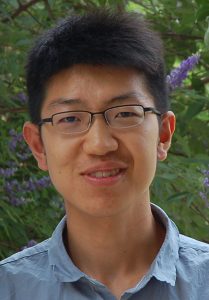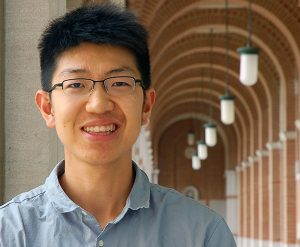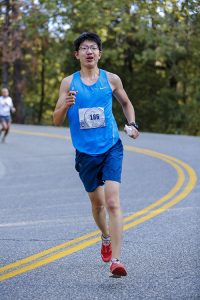 Recent CS alumnus Zhouhan Chen chose Rice University for its programs and approachable faculty. He said, “I knew I wanted to pursue something in Engineering and that I wanted an opportunity to do research as an undergraduate, and Rice had a good reputation for both.”
Recent CS alumnus Zhouhan Chen chose Rice University for its programs and approachable faculty. He said, “I knew I wanted to pursue something in Engineering and that I wanted an opportunity to do research as an undergraduate, and Rice had a good reputation for both.”
In his first semester, he tried a course in Materials Sciences and one in Computer Science. “My interest was piqued by the game creation course, COMP 160. I liked both the logic it required and the project-based approach. We tackled weekly goals until the game was done. In computer science, you can literally create something from scratch and enjoy the process as you build the project,” said Chen.
By the time he finished his second course, COMP 182, he had decided to major in CS. That same spring, he attended an undergraduate research fair and talked with professors in different departments about their research projects.
He was intrigued by the machine learning work of CS professor Devika Subramanian and emailed her that night. Within 24 hours, Subramanian had invited him to a meeting in her office.
Chen said, “Devika handed me a USB drive with three million Tweets on it. They covered the span of the 2014 Hong Kong Umbrella revolution and had been collected by a CS grad student, Rima Tanash. I was supposed to help examine the contents and find out how sentiments had changed over the course of events. That was the first thing she gave me.”
The research started with a timeline and distribution mapping by user, then Chen went through individual Tweets to identify sentiment analysis, training a random forest model to predict the overall sentiment.
 “There is a difference in working on a problem that has already been solved by others, and working on a problem that has never been solved,” said Chen. “One of the problems we ran into was the clutter of content created by bots. It was hard to measure human sentiment when a lot of the data had been created by automated accounts.”
“There is a difference in working on a problem that has already been solved by others, and working on a problem that has never been solved,” said Chen. “One of the problems we ran into was the clutter of content created by bots. It was hard to measure human sentiment when a lot of the data had been created by automated accounts.”
So the team expanded their research project and Chen helped develop a new protocol to detect Twitter bots. “This year at the Rice Undergraduate Research Symposium, my poster on our protocol won second place in the Engineering Division,” Chen said.
He also began researching Twitter censorship in Turkey with Tanash, Subramanian, CS professor Dan Wallach, and a graduate student at the University of Houston. “That is the project that led to a paper,” he said, “Rima presented it at an ACM conference in 2015, and I have to thank her for letting me work on it.”
Chen said the research team used controllers based on Twitter’s public API to collect specific data based on geographic location. Using a timeline and distribution, they identified when Tweets were being suppressed, then collaborated with professors in Political Science and the Baker Institute who knew Turkish politics and could relate the withheld Tweets to political events there.
“We applied machine learning on topic classification, using an algorithm called non-negative matrix factorization. The reverse engineering showed what was happening and I really enjoyed the interdisciplinary aspect of that research. My takeaway was discovering the satisfaction of collaboration to solve problems none of us could have efficiently solved alone.”
Chen has managed to blend academic research with industry experience and could easily find a job with his bachelor’s degree, but he wants to complete the research he began with Subramanian’s team so he’s staying at Rice for a graduate degree.
He said, “Last summer, I interned at App Annie, a company in the Bay Area that helps app developers analyze the data their products collate. This summer, I’m staying in Houston to do analytics work for Quantlab Financial. Then in August, I’m back at Rice for the Masters program, and the research team will be continuing work on another project about Turkish Twitter censorship. There is always more to analyze because the political climate keeps changing.”
Chen advises other CS undergraduates to try taking a variety of CS classes and not shy away from ones that are difficult. “You learn a lot in those courses, even if you don’t score very high. The score is not the most important thing you get out of class.”
He also recommends developing relationships with faculty members. “Don’t be afraid to talk to professors. I took a chance and reached out to Devika and feel lucky I got a chance to talk with and work with her. She’s provided lots of good advice on what classes to take and future career goals. Also, when we worked together on the project, she taught me how to write good papers and design good posters.”

Zhouhan Chen, running a half marathon in Yosemite. Photo credit: Lucid Races. http://www.lucidraces.com
Chen compared research to marathons, which he began running in high school. “Running is good training for research, both physically and mentally. Running allows me to think about my research efforts; learning to run long distances helps you learn perseverance.”
He’s run six marathons with the Rice Road Runners, a student club where he served as president for two years. One of Chen’s favorite races was the marathon he ran through Yosemite National Park.
“Sometimes I think running the race is a physical marathon and research is a mental marathon. Research problems are usually open-ended – it may take a long time and you may not get good results. It can be discouraging, but you just keep going and eventually you will get there.”
Zhouhan Chen completed his B.S. in Computer Science in 2017.